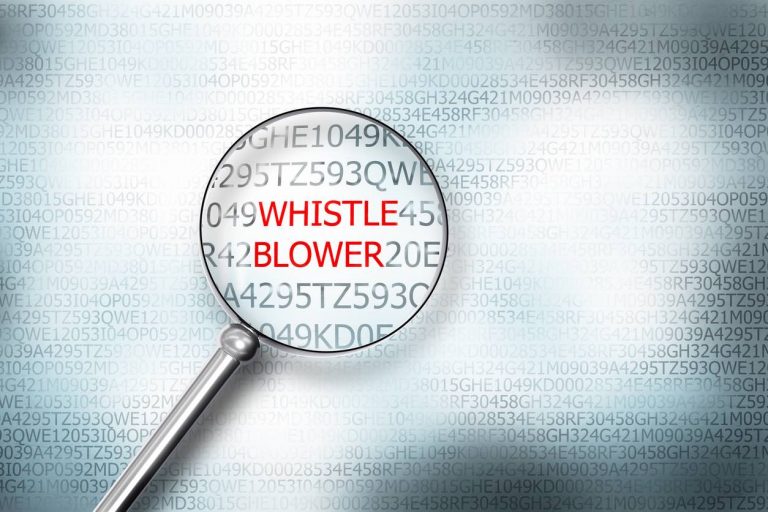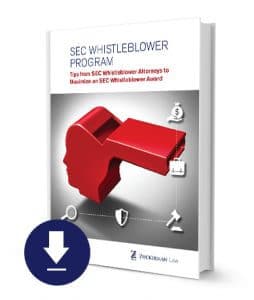SEC Whistleblower Tips: What is the SEC Form TCR?
The SEC Form TCR (“Tip, Complaint, or Referral”) is the form that whistleblowers and their attorneys use to submit tips to the SEC Whistleblower Office. To maximize the possibility of obtaining an SEC whistleblower reward, it is important to understand the key sections of the Form TCR.
If you have original information that you would like to report to the SEC Office of the Whistleblower, contact the Director of our SEC Whistleblower Practice at [email protected] or call our leading SEC whistleblower lawyers at (202) 930-5901 or (202) 262-8959. All inquiries are confidential.
Ask us how we have successfully obtained multi-million dollar awards for SEC whistleblowers.
Section B of the SEC Form TCR
Section B requests information about the whistleblower’s attorney. This section is important because whistleblowers can submit their tips anonymously if represented by attorneys, allowing them to leave Section A blank. This is a critical advantage of the SEC Whistleblower Program as compared to other whistleblower programs, such as the IRS Whistleblower Program, which do not allow for anonymous reporting.
Section D of the SEC Form TCR
Eligibility for SEC Whistleblower Award
Section D asks whistleblowers to describe their complaints. Many of Section D’s questions, however, are aimed at determining whether a particular whistleblower is eligible for an SEC award (even though Section E is technically the “eligibility” section). Importantly, almost all whistleblowers can become eligible for awards, if they take certain steps. This includes employees and contractors, such as compliance personnel, auditors, directors, and officers, who may incorrectly assume they are ineligible for SEC awards. Even whistleblowers who were involved in the fraud or misconduct may be eligible for awards.
External auditors, for example, generally are not eligible to receive SEC whistleblower awards. This is particularly true for external auditors who obtained their information during an audit of an issuer. However, an exception allows these external auditors to become eligible if they report the violation or fraud to a superior in their independent public accounting firms and the firms fail to promptly report the information to the SEC. If this happens, the external auditors can report immediately to the SEC and be eligible for awards.
The SEC’s rules include many similar exceptions that allow otherwise-ineligible whistleblowers to become eligible by taking certain steps. Whistleblowers should consult with an experienced SEC whistleblower attorney to determine whether they are, or may become, eligible for SEC whistleblower awards. This consultation could be the difference between a multimillion-dollar whistleblower award and no award at all.
Maximize Your SEC Whistleblower Award
Many questions in Section D will also affect a whistleblower’s future award percentage. Under the program, a whistleblower may receive an award of between 10% and 30% of the total sanctions imposed because of his or her tip. To maximize the size of a potential award, whistleblowers should evaluate the factors that the SEC considers when determining an award percentage and stress these factors in their submissions. This analysis must occur prior to submitting information to the SEC.
Section D, part 5b, for example, asks whether the whistleblower “reported this violation to his or her supervisor, compliance office, whistleblower hotline, ombudsman, or any other available mechanism at the entity for reporting violations.” While this question may be important in determining a whistleblower’s eligibility (in cases involving, e.g., the 120-day exception), it may also impact a whistleblower’s award percentage. According to the SEC’s Final Rules, the whistleblower office may increase the amount of an award if the whistleblower “reported the possible securities violations through internal whistleblower, legal or compliance procedures before, or at the same time as, reporting them to the Commission.” So, whistleblowers should strongly consider reporting internally to their companies before reporting to the SEC. After reporting internally, however, most whistleblowers are incentivized to report to the SEC as soon as possible.
Another way to maximize a potential award lies in Section D, part 12, which asks whistleblowers to provide “any additional information [they] think may be relevant.” This section offers whistleblowers an opportunity to identify and emphasize other aspects of the claim that would support an increased award percentage. The SEC may issue a larger award to a whistleblower who, for example, experienced any “unique hardships . . . as a result of his or her reporting and assisting in the enforcement action.” (Rule 21F-6(a)(2)(vi).) Whistleblowers should, on their Form TCR, discuss any retaliation they experienced and any personal risks they took to expose the fraud. Again, whistleblowers should consider these factors before submitting a tip to the SEC.
Identify the Securities Law Violations for the SEC
Section D, part 8 asks whistleblowers to explain why they believe the acts described “constitute a violation of the federal securities laws.” Whistleblowers should determine what violations qualify for an SEC award, and provide the SEC with a clear roadmap describing how the reported acts establish specific qualifying violations.
Whistleblowers should also describe why the violations are material. In the past five years, whistleblowers have filed more than 18,000 tips with the SEC Whistleblower Office. The SEC will use its limited resources to investigate only the best tips. Whistleblowers should therefore explain, in detail, why their tips warrant the use of the SEC’s resources. If a whistleblower is uncertain about a specific violation, he or she may benefit from reading prior SEC enforcement actions and consulting with an experienced SEC whistleblower attorney.
Provide Specific Evidence of the Violation
Section D, part 9 asks whistleblowers to “[d]escribe all supporting materials in [their] possession and the availability and location of any additional supporting materials not in [their] possession.” The SEC Whistleblower Office is more likely to act on a tip if it is supported by strong evidence. Evidence is strong if it is specific, timely, and credible. For example, a whistleblower may provide documentation that walks the SEC through an example of the fraud, step by step, and explains how the fraud materially impacts the entity, its investors, or both.
Notably, recent decisions have clarified what company documents a whistleblower may use—even if the whistleblower signed a confidentiality agreement—to disclose fraud to the government. In Erhart v. BofI Holding, Inc., the U.S. District Court for the Southern District of California held that confidentiality agreements do not trump federal whistleblower rights and that whistleblowers are permitted to take an “appropriate” amount of company documents to disclose fraud to the government. According the order, a whistleblower’s evidence may be considered “appropriate” when it is carefully selected, specifically related to the violation, and accessible in the ordinary course of the employee’s duties. Whistleblowers who engage in “vast and indiscriminate” collection of company documents, on the other hand, may not be immune from potential liability.
Finally, whistleblowers should not provide all types of evidence. The SEC does not want, for example, information that may violate the company’s attorney-client privilege. If a whistleblower has questionable evidence, he or she should consult with an attorney and should potentially notify the SEC to have its taint team handle the evidence.
Protect Your Identity
After providing a detailed explanation of the fraud and the evidence to support it, a whistleblower should identify any information in the submission that could expose him or her as the whistleblower. Section D, part 11 asks whistleblowers to “[i]dentify with particularity any documents or other information in [their] submission[s] that [they] believe could reasonably be expected to reveal [their] identit[ies] and explain the basis for [their] belief that [their] identit[ies] would be revealed if the documents were disclosed to a third party.”
The SEC takes its responsibility to protect whistleblowers’ identities very seriously. Whistleblowers can assist this effort by flagging any information that could potentially identify them. The SEC will then determine the best path to open an investigation without tipping off the target that a whistleblower is even involved.
Section F of the SEC Form TCR
Whistleblowers must sign the Form TCR under the penalty of perjury. Section F requires the whistleblower to affirm the following:
“I declare under penalty of perjury under the laws of the United States that the information contained herein is true, correct and complete to the best of my knowledge, information and belief. I fully understand that I may be subject to prosecution and ineligible for a whistleblower award if, in my submission of information, my other dealings with the SEC, or my dealings with another authority in connection with a related action, I knowingly and willfully make any false, fictitious, or fraudulent statements or representations, or use any false writing or document knowing that the writing or document contains any false, fictitious, or fraudulent statement or entry.”
If a whistleblower submits a tip anonymously, then his or her signed declaration will not be included in the SEC filing. Rather, the anonymous whistleblower’s attorney will sign Section G and keep the whistleblower’s signed declaration in a private file.
For more information about whistleblower rewards and bounties, contact the SEC whistleblower lawyers at Zuckerman Law at 202-930-5901. Click below to hear SEC whistleblower lawyer Matt Stock’s tips for SEC whistleblowers:
To learn more about the SEC Whistleblower Program, download Zuckerman Law’s eBook: SEC Whistleblower Program: Tips from SEC Whistleblower Attorneys to Maximize an SEC Whistleblower Award:
- See our column in Forbes: One Billion Reasons Why The SEC Whistleblower-Reward Program Is Effective.
- See our column in Going Concern: Sarbanes-Oxley 15 Years Later: Accountants Need to Speak Up Now More Than Ever.
- See our post in Accounting Today: Whistleblower Protections and Incentives for Auditors and Accountants.
- See our article providing Tips for SEC Whistleblowers
How to Qualify for an SEC Whistleblower Award: Tips from SEC Whistleblower Lawyers
SEC Whistleblower Rewards Attorneys
How to Successfully Navigate the SEC Whistleblower Process
SEC Whistleblower Awards and Bounties










